All rights reserved. Copyright © 2019 Renegade University
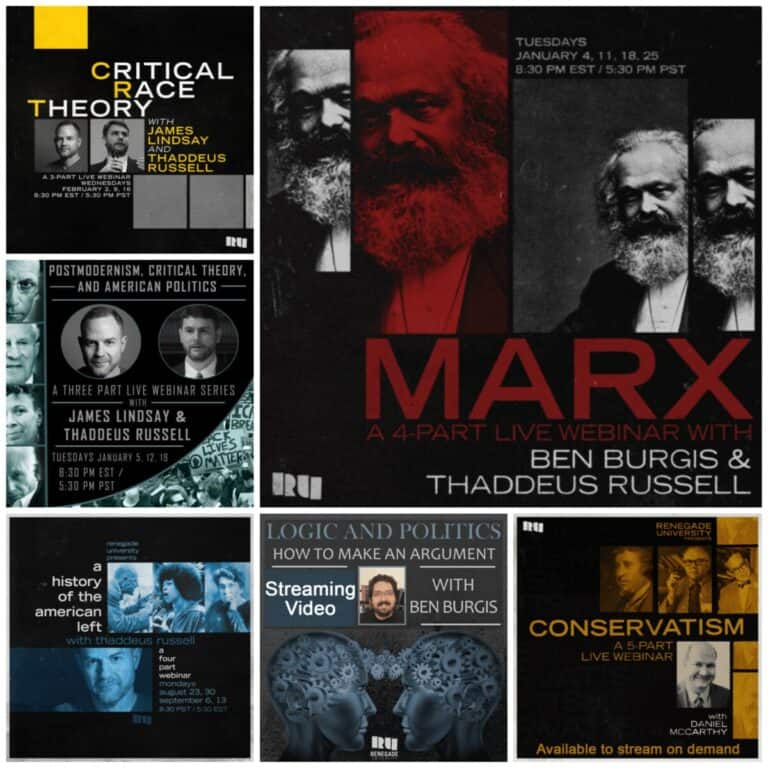
Left & Right Bundle
In the RU Left & Right bundle, you’ll learn from a variety of instructors on the history and philosophy of left and right wings ideologies and movements. This bundle includes access to recordings of four on-demand RU courses plus access to the upcoming courses on Marx, co-taught by Ben Burgis and Thaddeus Russell, and on Critical Race Theory, co-taught by James Lindsay and Thaddeus Russell.
$784.00
Included in This Bundle
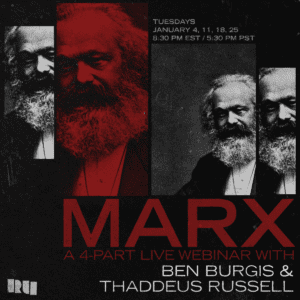
Marx
Co-taught by Marxist philosopher and Jacobin columnist Ben Burgis and historian and critic of Marxism Thaddeus Russell, this course offers an opportunity to explore nuances and criticisms that can only emerge in discussion between people with radically different points of view.
For those who have not read Marx’s writings, the course will provide an introduction to his major ideas. For those already familiar with Marx, the course is unique among university curricula in that it offers an opportunity to participate in a debate on the meaning and consequences of his work.
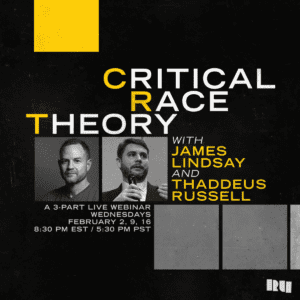
Critical Race Theory
This course examines the invention, deployment and growing popularity of Critical Race Theory in the media, education, and politics.
We will examine the work of Derrick Bell, Kimberle Crenshaw and other founders of CRT, then analyze the ways in which it has been used in news reporting, in classrooms, and in American politics.
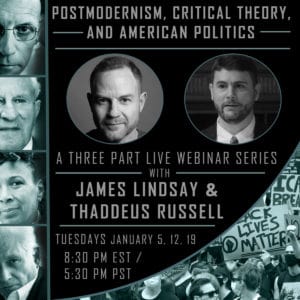
Postmodernism & Critical Theory
Are “critical theory” and postmodernism the sources of authoritarian “social justice” and “identity” politics emanating from college campuses? Do the ideas of “critical theorists” like Herbert Marcuse and Kimberlé Crenshaw and postmodernist philosophers like Michel Foucault and Jacques Derrida constitute a threat to political freedom or are they consistent with the ethic of personal liberty? Are these ideas deeply held and well-intentioned beliefs or just “cynical theories” intended to undermine every aspect of society and institute repressive rule?
This course is unique among university courses in that it is co-taught by two scholars of critical theory and postmodernism who are on opposite sides of many of these questions. This course is not only a three-session discussion, but also a civil, respectful debate involving the instructors and participants.
By examining the texts associated with the notorious schools of thought, we will all deepen our understanding of ideas that both instructors agree have shaped the discourse in mainstream American media and politics.
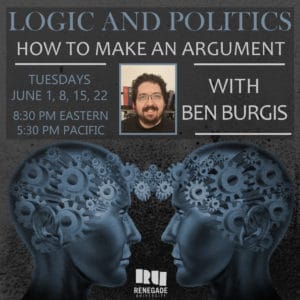
Logic and Politics: How to Make an Argument
In this course you’ll learn how to break apart arguments and see if they work and, when they don’t, where and how they go wrong.
In a typical university informal logic or “critical reasoning” course, you might do this by studying unrealistic stock examples—arguments no one would ever make in real life. Instead, in this course, we’ll focus on examples from real arguments made in hotly contested political and philosophical debates on subjects ranging from capitalism vs. socialism to gender identity.
In all cases, the point isn’t to tell you what to think, but to help you sharpen the analytic tools you can use to sift through these issues for yourself.
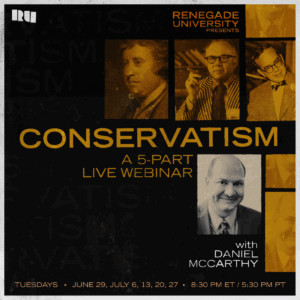
Conservatism
Conservatism is a much-contested idea, and in some quarters a much-reviled one. Is conservatism just another word for fascism, as many critics believe? Did conservatism betray its roots by turning illiberal? Or is conservatism a distinct tendency in political thought and action that is neither fascist nor liberal, but a powerful critique of both?
Covering such schools of thought as traditionalism, individualism, Machiavellianism, and Straussian neoconservativism and its foil, “paleoconservativism”, this five-lecture course makes the case for conservatism as understood by its own best thinkers and through the themes characteristic of their thought. Radicals, progressives, and liberals, no less than conservatives, libertarians, and the simply curious will profit from this intense exploration of this neglected yet powerful body of thought.
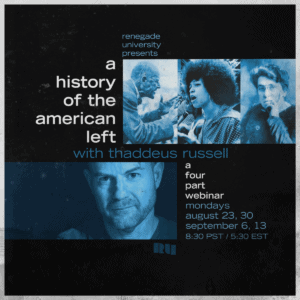
A History of the American Left
This course examines the history of the political and intellectual movement that is now at the heights of American culture. Though the great majority of Americans do not identify as radical or left-wing, what is called “the left” has taken commanding positions in many parts of American society.
Since the 1930s, socialists, communists, and social democrats have controlled many of the major labor unions in the United States, and with that power have continued to exert influence over American electoral politics. Since the 1960s, the left has dominated academia, and few college graduates have not been exposed to the ideas of Marxism, radical feminism, or critical race theory.
We begin the course with an analysis of the intellectual origins of the modern American left, including Rousseau and the French revolution, Marx and “scientific socialism,” Eugene Debs and Christian socialism, “2nd-wave” radical feminism, and the anti-racism of the abolitionist, civil rights, and Black Lives Matter movements.
$784.00
